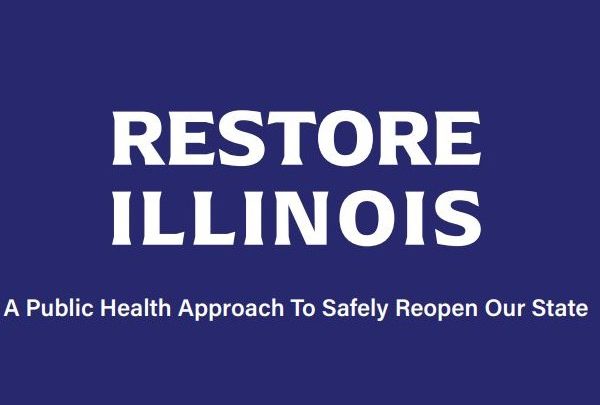On Tuesday April 5th, 2020, Illinois Governor J.B. Pritzker announced a plan to begin reopening the state while addressing the continued impact of the novel coronavirus. “Restore Illinois” is a five-phase procedure that will allow certain regions of the state to reopen ahead of others.
As of the publishing of this article, Illinois is currently in Phase 2 and the Governor has not announced a specific time line for implementation of Phases 3 through 5, at this time.
Source: Restore Illinois: A Public Health Approach To Safely Reopen Our State
Restore Illinois is a five-phase regional plan to reopen the state’s economy on a regional basis in accordance with key public health metrics.
• Clear Phases: Restore Illinois lays out five phases that regions will move through together, ensuring we move forward in a safe and deliberate manner while providing businesses and families more clarity on our next steps.
• Health Metrics: The plan is based on key health metrics, like positive test rates and hospital capacity and admissions, that the Illinois Department of Public Health will assess to determine when it is safe for a region to move forward.
• Regional Approach: Restore Illinois recognizes the distinct impact COVID-19 has had on different regions of the state. Using the long-existing Emergency Medical Services Networks, the plan uses four regions – Northeast Illinois, North-Central Illinois, Central Illinois, and Southern Illinois – that will move through each phase together.
• Safe Reopening: As health metrics tell us it is safe to move forward, regions will gradually reopen nonessential businesses, allow employees to begin returning to work, expand outdoor recreation, and increase gathering sizes.
The five phases of reopening for each health region are as follows:
Phase 1 – Rapid Spread: The rate of infection among those tested and the number of patients admitted to the hospital is high or rapidly increasing. Strict stay at home and social distancing guidelines are put in place and only essential businesses remain open. Every region has experienced this phase once already and could return to it if mitigation efforts are unsuccessful.
Phase 2 – Flattening: The rate of infection among those tested and the number of patients admitted to the hospital beds and ICU beds increases at an ever slower rate, moving toward a flat and even a downward trajectory. Non-essential retail stores reopen for curb-side pickup and delivery. Illinoisans are directed to wear a face covering when outside the home, and can begin enjoying additional outdoor activities like golf, boating and fishing while practicing social distancing. To varying degrees, every region is experiencing flattening as of early May.
Phase 3 – Recovery: The rate of infection among those tested, the number of patients admitted to the hospital, and the number of patients needing ICU beds is stable or declining. Manufacturing, offices, retail, barbershops and salons can reopen to the public with capacity and other limits and safety precautions. All gatherings limited to 10 or fewer people are allowed. Face coverings and social distancing are the norm.
Phase 4 – Revitalization: The rate of infection among those tested and the number of patients admitted to the hospital continues to decline. All gatherings of up to 50 people are allowed, restaurants and bars reopen, travel resumes, child care and schools reopen under guidance from the IDPH. Face coverings and social distancing are the norm.
Phase 5 – Illinois Restored: With a vaccine or highly effective treatment widely available or the elimination of any new cases over a sustained period, the economy fully reopens with safety precautions continuing. Conventions, festivals and large events are permitted, and all businesses, schools, and places of recreation can open with new safety guidance and procedures in place reflecting the lessons learned during the COVID-19 pandemic.
If you have legal questions regarding how the plan impacts your property, do not hesitate to contact KSN. Our law firm can be reached by calling 855-537-0500 or by visiting www.ksnlaw.com.
Since 1983, KSN has been a legal resource for condominium, homeowner, and townhome associations. Additionally, we represent clients in real estate transactions, collections, landlord/tenant issues, and property tax appeals. We represent thousands of clients and community associations throughout the US with offices in several states including Florida, Illinois, Indiana, and Wisconsin.
Please note the material contained in this article is for educational and informational purposes only and does not constitute legal advice. No attorney-client relationship is established by your review or receipt of the information contained in this article. You should not act on the information discussed in this article without first obtaining legal advice from an attorney duly licensed to practice law in your State. While KSN has made every effort to include up-to-date information in this article, the law can change quickly. Accordingly, please understand that information discussed in this article may not yet reflect the most recent legal developments. Material is not guaranteed to be correct, complete, or up to date. KSN reserves the right to revise or update the information and statements of law discussed in the article law at any time, without notice, and disclaims any liability for your use of information or statements of law discussed on the article, or the accessibility of the article generally. This article may be considered advertising in some jurisdictions under applicable law/s and/or ethical rules/regulations. © 2020 Kovitz Shifrin Nesbit, A Professional Corporation.

